

Trolls. February 2008 A user on Hacker News recently posted a comment that set me thinking: Something about hacker culture that never really set well with me was this—the nastiness. ...
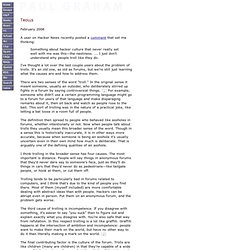
I just don't understand why people troll like they do. I've thought a lot over the last couple years about the problem of trolls. It's an old one, as old as forums, but we're still just learning what the causes are and how to address them. There are two senses of the word "troll. " The definition then spread to people who behaved like assholes in forums, whether intentionally or not. I think trolling in the broader sense has four causes. Trolling tends to be particularly bad in forums related to computers, and I think that's due to the kind of people you find there.
The third cause of trolling is incompetence. The final contributing factor is the culture of the forum. Technical tweaks may also help. So far the experiment seems to be working. Six Principles for Making New Things. February 2008 The fiery reaction to the release of Arc had an unexpected consequence: it made me realize I had a design philosophy.
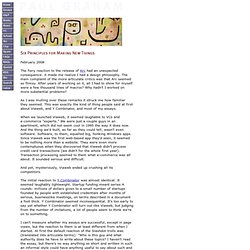
The main complaint of the more articulate critics was that Arc seemed so flimsy. After years of working on it, all I had to show for myself were a few thousand lines of macros? Why hadn't I worked on more substantial problems? As I was mulling over these remarks it struck me how familiar they seemed. When we launched Viaweb, it seemed laughable to VCs and e-commerce "experts. " And yet, mysteriously, Viaweb ended up crushing all its competitors. The initial reaction to Y Combinator was almost identical. I can't measure whether my essays are successful, except in page views, but the reaction to them is at least different from when I started.
Now people are saying the same things about Arc that they said at first about Viaweb and Y Combinator and most of my essays. Why to Move to a Startup Hub. October 2007 After the last talk I gave, one of the organizers got up on the stage to deliver an impromptu rebuttal. That never happened before. I only heard the first few sentences, but that was enough to tell what I said that upset him: that startups would do better if they moved to Silicon Valley.
This conference was in London, and most of the audience seemed to be from the UK. So saying startups should move to Silicon Valley seemed like a nationalistic remark: an obnoxious American telling them that if they wanted to do things right they should all just move to America. The Future of Web Startups. October 2007 (This essay is derived from a keynote at FOWA in October 2007.)
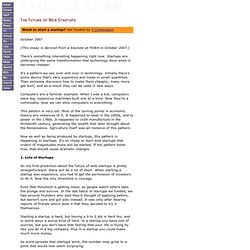
There's something interesting happening right now. Startups are undergoing the same transformation that technology does when it becomes cheaper. It's a pattern we see over and over in technology. Initially there's some device that's very expensive and made in small quantities. Computers are a familiar example. This pattern is very old. Now as well as being produced by startups, this pattern is happening to startups. 1. So my first prediction about the future of web startups is pretty straightforward: there will be a lot of them. Even that threshold is getting lower, as people watch others take the plunge and survive. Starting a startup is hard, but having a 9 to 5 job is hard too, and in some ways a worse kind of hard. As word spreads that startups work, the number may grow to a point that would now seem surprising. How to Do Philosophy. September 2007 In high school I decided I was going to study philosophy in college.
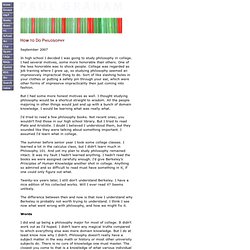
I had several motives, some more honorable than others. One of the less honorable was to shock people. College was regarded as job training where I grew up, so studying philosophy seemed an impressively impractical thing to do. Sort of like slashing holes in your clothes or putting a safety pin through your ear, which were other forms of impressive impracticality then just coming into fashion. But I had some more honest motives as well. I'd tried to read a few philosophy books. The summer before senior year I took some college classes. Twenty-six years later, I still don't understand Berkeley. The difference between then and now is that now I understand why Berkeley is probably not worth trying to understand.
News from the Front. September 2007 A few weeks ago I had a thought so heretical that it really surprised me.
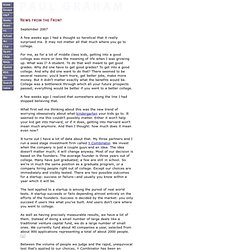
It may not matter all that much where you go to college. For me, as for a lot of middle class kids, getting into a good college was more or less the meaning of life when I was growing up.